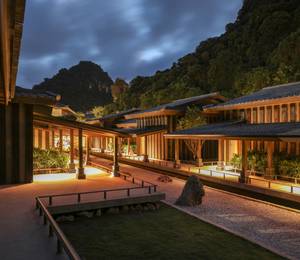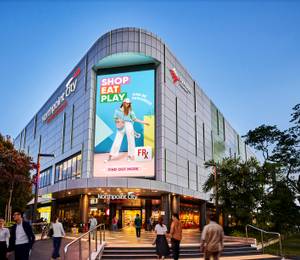The Nicholas Learning Centre, at Methodist Ladies’ College, Melbourne, embodies the benefits of learning within a conceptually adventurous setting. John McIldowie, founder of McIldowie Partners, explains how his firm utilised advanced materials – including Capral framing suites (AGS Commercial 419 Flushline and 400 Narrowline), melded with high-efficiency glazing – to create a unique learning environment intimately connected to its landscaped surrounds.
The building’s twin purposes drove its final form in two ways. “Firstly, our aim with the Nicholas Learning Centre was to reroute Grove Avenue, which had previously divided the entire campus,” explained John.
“To open everything up, we sought to repurpose this former dividing element into a central public landscape space, which we viewed as an important urban gesture. Achieving this aim required the demolition of two existing buildings, which enabled us to draw the campus’s rigid North/South orientation into a wider landscape while creating a compelling central space,” John added.
To achieve its educational goals, the Nicholas Learning Centre required a design that would encourage openness and exchange between students of different levels. “The building aims to support and nurture students throughout the transition from junior to senior school, so it has to be a welcoming environment,” said John. “This is a formative change in their social skills and learning, representing perhaps the largest change students experience during their schooling,” he added.
Supporting this positive vision required an architecture of growth and openness. “Our choice of glazing and framing were important, because the student areas are sited adjacent to the gardens,” said John. “Flooding the entire building with natural light, the glazed Western façade breathes life into the new heart of the campus. By choosing Capral window suites which work sensitively with the glazing, we have created a range of outdoor learning opportunities directly adjacent to the learning spaces,” he added.
Before this positive vision could be realised, the architects had to grapple with a restrictive site.
“The building’s orientation wasn’t ideal, so we had to think carefully about the framing and glazing in the East/West elevation,” said John. “To keep out harsh sun, the exterior features deep hanging balconies, with the facades shading the glass throughout the school day,” he added.
“The glazing and framing system also minimises heat loss and improves internal comfort for occupants, with large overhangs shading the glass and windows operable on both sides,” continued John. “The glazing system also works as a key part of the natural stack ventilation system, which includes a “traffic light” system, informing staff and students on whether natural cooling or air conditioning is the most appropriate way to heat or cool the space,” he added.
The Capral windows proved central to the project’s visual feel. “For the exterior, we specified a 150x50mm Capral aluminium suite,” he said. “Capral’s properties enabled us to specify a high proportion of glass in the project, giving the building’s appearance a high level of clarity and crispness. The framing makes the glazing a virtually continuous visual element,” he added.
On the Eastern elevation, the glazing plays more of a compositional role. “The window suites and glazing fit in with the grey bluestone eastern walls,’ notes John. ‘There are four types of bricks progressively graded from light to dark, a transition bringing warmth to the exterior,” said John.
This innovative new building at the heart of MLC’s campus fully utilises the capacities of each material used, including the unique structural, environmental and visual capacities of Capral’s advanced window and façade systems.















